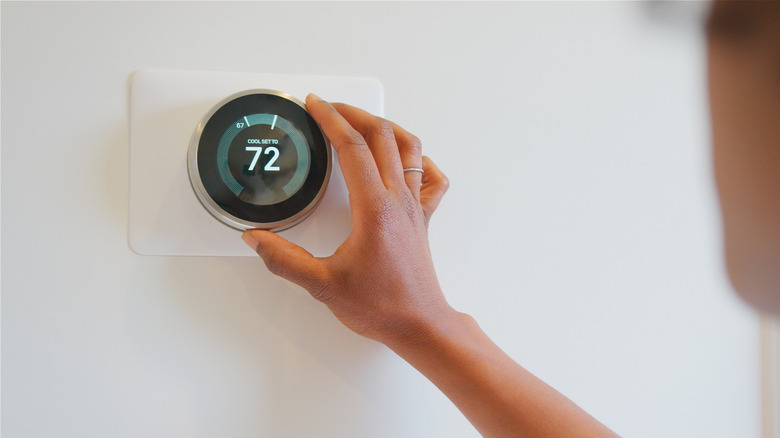The Ideal Ambient Thermostat Setting That Can Actually Boost Your Mood
A clean and functioning HVAC system is arguably the most important way to make your home comfortable throughout the seasons, all while keeping both mold and dust mites in your home at bay. Finding the right temperature isn't always so simple, though. You might also find yourself up against other members of your household who tend to run cooler or warmer than you do. Choosing the right ambient temperature depends on much more than personal preference. In fact, research shows that you're more likely to experience a better mood and overall cognitive function when you set your thermostat to between 70 and 72 degrees Fahrenheit with a humidity level between 40% and 70%.
Setting the thermostat to the perfect temperature can cause a lot of debate. Generally speaking, an in-home temperature between 68 and 72 degrees keeps most adults comfortable during the day. At night, lowering the thermostat to between 60 and 67 degrees can help you sleep better. You'll want to keep this in mind when you're trying to determine the ideal temperature to keep your bedroom at.
The connection between ambient temperature and mood
Some people naturally run cooler or warmer, and they may prefer thermostat settings that are higher than 72 degrees or perhaps lower than 70 degrees. If you're looking to boost your overall mood, though, you may want to consider keeping your own thermostat within this range. This is especially the case during the day if you work or attend school from home. Over time, you may find that you can concentrate better and experience improved analytical skills. It's even possible to have a creativity boost and work more effectively with others. With these possible benefits in mind, it's worth testing out these ambient temperatures in your home.
If the 70 to 72 degree range isn't usually to your liking, consider dressing in layers. While some people do run colder, being in too warm of a space can pose a range of mental health risks. Mood changes from excessive heat can include irritability, stress, anxiety, depression, and poor concentration. If you already have an HVAC system, then running it at the right temperature may help to prevent these mood fluctuations.
Also, if you are concerned about rising energy costs, it's worth considering ways to make your HVAC system more efficient. Learning what to expect as AC systems continue to evolve can help inform your decision to upgrade when the time comes. You can also stay cool by using fans and staying hydrated throughout the day. If you start to experience unexplained mood changes in a warmer space, this is a sign you may need to turn down the thermostat.

